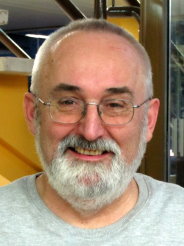| Pages in topic: < [1 2] | Advanced Translation Techniques: 10,000 words per day Thread poster: Mike007
|
|---|
Samuel Murray 
Netherlands
Local time: 19:15
Member (2006)
English to Afrikaans
+ ...
| Talking of dictionaries... | Sep 12, 2008 |
Mike007 wrote: The only CD I have is the Collins Robert French-English which is very helpful, if limited. What ones do you use? (I'd never go back to paper I have to say) 
My bilingual dictionaries are English-Afrikaans. I have an economics dictionary (90 000 headwords, 2004), a financial dictionary (30 000, 2003), a technical dictionary (30 000, 1993), and a general dictionary (100 000, 2005). All four use Folio Views, which is annoying because you can't copy text from it, but at least the keyboard shortcuts are fairly simple.
I also have another general dictionary (approx 60 000 headwords, 1997), a monolingual (Afrikaans) general dictionary (96 000, 1993) and a monolingual (Afrikaans) thesaurus (150 000 entries, 1994). These three use Logos Library System, an old 16-bit system. It is a pain to use but it is faster than looking up in a paper dictionary.
Incidently, I have almost all of these dictionaries in book format too.
Sadly, my two medical dictionaries, my mining and minerology dictionaries and my chemistry dictionary are all only in book format... and I do a lot of pharmaceutical and mining related work. The same goes for the Afrikaans spelling rules -- it is only available in book format.
Would you rate Wordfast over Trados? I've used Trados, DVX, SDLX and Multitrans, but not Wordfast...does it have any features that set it apart from the competition?
Wordfast is simple, and is a keyboard user's dream. But perhaps I'm too dim for Trados, and perhaps my mouse hand is just stupid.
| | | | | I could have sworn.... | Sep 12, 2008 |
Lawyer-Linguist wrote:
Funny, because apart from the word count, it sounds a little like me ...
you were somewhere in that range. I remember being rather impressed at a word count you quoted in some discussion and thinking it's time to upgrade my old Dragon license. In any case, I'll never beat you in a word count race. Just try dealing with all the damned subscripts in a chemical formula or trying to make some long organic compound name come out right in dictation. If anyone can do that he or she deserves a medal.
| | | |
... not quite
Might well have been a one-off "burst speed" job that was being discussed. Even so, that would only have been raw output (i.e. not revised) or a text with a lot of repetition. Certainly not something I could sustain.
Typically I work two to three "shifts" a day (depending on what I have to get through), and try to do a maximum of around 1,500 - 2,000 words per shift.
So, disco... See more ... not quite
Might well have been a one-off "burst speed" job that was being discussed. Even so, that would only have been raw output (i.e. not revised) or a text with a lot of repetition. Certainly not something I could sustain.
Typically I work two to three "shifts" a day (depending on what I have to get through), and try to do a maximum of around 1,500 - 2,000 words per shift.
So, discounting where we are held up by fiddly things like case names and references, chemical subscripts and the like, we're probably able to achieve more or less the same output with speech recognition Kevin.
By the end of a six-week stint of that, I need a four- or five-day break (including a weekend) and I usually fly somewhere to get away from my desk. Got back from London again on Tuesday morning, for instance. I think regular breaks are very important in this profession to avoid burnout.
I've been far more productive since doing that, starting to use speech recognition and switching off Skype after realising I was spending too much time on that assisting other people with legal translation questions. Clients who need to speak to me on Skype know they can phone on it, will be diverted to my mobile (at my expense) and then I just switch Skype on. Otherwise I find it a time-waster.
I also ask my clients not to phone, unless it's urgent. I check my emails very regularly and find that less disruptive than the phone. They know I reply very quickly, so I hardly receive phone calls these days. Some people enjoy phone contact, I don't as it breaks my flow.
I also set myself targets of what to get through in 50 minute sessions, using the rest of the hour to answer emails, get up to stretch, make a cup of tea, whatever.
I appreciate others may find my approach too rigid, but I'm used to billing per hour as a lawyer, so my eye is instinctively on the clock. I do this work to make money, enjoy what I do, but at the end of the day if it didn't pay well, I wouldn't do it. To achieve that, you have to be disciplined about time management.
Give me something out of my field though and my speed will drop dramatically, probably to around 2,000 words for the whole day. That's not profitable, even at good rates, simply because we don't get paid for research. As such, I stick to law (and some financial) and am just very fortunate there aren't many genuine legal specialists in my language pairs. The volume is there, and you can pick and choose really, especially in Dutch to English.
[Edited at 2008-09-13 07:15] ▲ Collapse
| | | | Adrian MM. (X)
Local time: 19:15
French to English
+ ...
| Hit 14,000 - 15,000 words a day incrementally, depending on source-to-target lingos | Sep 13, 2008 |
[quote]Kevin Lossner wrote:
'We've got a specialist for legal stuff who often posts in the forums who claims a typical daily output of somewhere around 10,000 words a day. As far as I know she does most of her work with voice input and sticks strictly to the subject she knows best and practiced as an attorney.'
Voice input: I use remote-location digital audio-typists - a service now offered on the Internet - at up to 110 words a minute who have a strong legal and medical background. Advantages over VRS/voice recognition systems like Dragon:
1. far less installation space required for Olympus, Grundig and Philips transcription kits;
2. having worked together for over 20 years, we can turn around about 2,000 words an hour: I dictate Romance faster than Germanic.
3. a built-in editor: a VRS asks the 'dictator' neither if the output makes sense, nor picks up on source-language words, clauses, paras. or even entire pages omitted in the translation.
4. no need to dictate lists of figures and numbers in tables, such as annual reports and accounts.
5. disadvantage: erosion of profit margin through typists' charges.
[Edited at 2008-09-13 23:51]
| | |
|
|
|
| Much prefer e-mail | Sep 14, 2008 |
Lawyer-Linguist wrote:
I also ask my clients not to phone, unless it's urgent. I check my emails very regularly and find that less disruptive than the phone. They know I reply very quickly, so I hardly receive phone calls these days. Some people enjoy phone contact, I don't as it breaks my flow.
[Edited at 2008-09-13 07:15]
I also much prefer e-mail. It does break the flow to get phone calls, not to mention it's less than useful to get a call about taking a job before I've actually seen the file. I've had many a "general legal text" turn into a patent application or the like (which I have then had to turn down when I got the e-mail).
| | | | | Reduce mouse usage (If you don't use VRS) | Sep 14, 2008 |
My typing/output increases as I learn more and more ways (i.e., keyboard shortcuts) to avoid using the mouse. That way my hands are most of the time on the keyboard and I save that "moving" time.
I also endorse colleagues suggestion (your own expertise field, concentration, digital dictionaries, etc.).
Take care,
Andrés
| | | | | Online references | Sep 14, 2008 |
Very interesting thread!
Besides what has been said, I would mention online references, there are many freely available but also very good subscription-based.
They might be worthwhile as they often offer access to several online references in one go.
At work I use www.oxfordreference.com, which is quite good for English reference material.
Regarding voic... See more Very interesting thread!
Besides what has been said, I would mention online references, there are many freely available but also very good subscription-based.
They might be worthwhile as they often offer access to several online references in one go.
At work I use www.oxfordreference.com, which is quite good for English reference material.
Regarding voice recognition software, how easy it is to switch across languages?
I believe that with some of them (like Dragon), you have to close the application and start it again to switch languages, which is really a pain if you want to use it to dictate in your target languages and, at the same time, to make searches in your source language.
How do you manage?
Daniel ▲ Collapse
| | | | | Audio method | Sep 15, 2008 |
Voice input: I use remote-location digital audio-typists - a service now offered on the Internet - at up to 110 words a minute who have a strong legal and medical background. Advantages over VRS/voice recognition systems like Dragon:
Hi there,
This system sounds interesting - do you record your own audio files and then send them to someone else for transcription/checking?
As I've never used voice recording, does it increase speeds over typing?
Thanks for your feedback,
Mike
| | |
|
|
|
| Very interesting, and with the qualitymark of Oxford | Sep 15, 2008 |
dgmaga wrote: Very interesting thread! Besides what has been said, I would mention online references, there are many freely available but also very good subscription-based. They might be worthwhile as they often offer access to several online references in one go. At work I use www.oxfordreference.com, which is quite good for English reference material. Regarding voice recognition software, how easy it is to switch across languages? I believe that with some of them (like Dragon), you have to close the application and start it again to switch languages, which is really a pain if you want to use it to dictate in your target languages and, at the same time, to make searches in your source language. How do you manage? Daniel
Is there anyting similar in German, French, Spanisch?
| | | | Adrian MM. (X)
Local time: 19:15
French to English
+ ...
| Email transcription | Sep 15, 2008 |
Mike007 wrote: Voice input: I use remote-location digital audio-typists - a service now offered on the Internet - at up to 110 words a minute who have a strong legal and medical background. Advantages over VRS/voice recognition systems like Dragon: Hi there, This system sounds interesting - do you record your own audio files and then send them to someone else for transcription/checking? As I've never used voice recording, does it increase speeds over typing? Thanks for your feedback, Mike
Yes. A portable digital dictaphone like a Grundig Digta - no need to be chained to the PC with e.g. a Philips Speechmike microphone - can input the dictation to a PC which serves as a dictation station. Sound files are stored and retrieved at will.
The huge, albeit compressed, voice file as a .wav is then emailed - by ISDN or pref. by ultra-fast Broadband - to the audio-typist's PC at a remote location. Normally, on most transcription kits, 1 hour of dictation generates a 6MB voice file.
The translation files emailed back can still be forwarded to an outside editor - but further eroding the profit margin.
There are Internet audio-typing transcription agencies advertising themselves. The target-audience seems to be mainly legal and secondarily medical and accounting, the latter being more of a number-crunching profession.
It has long been proven that, unless the translator is an extremely fast touch-typist, it's possible to dictate/speak 7 times faster than typing/keyboarding. Output must at least double, incrementally again over the years if you have no dictation recording practice, on the assumption that the work is there in the first place.
[Edited at 2008-09-15 14:59]
[Edited at 2008-09-15 14:59]
[Edited at 2008-09-15 15:00]
| | | | | Voice vs. Typing: which is faster? | Sep 16, 2008 |
Tom Thumb wrote:
It has long been proven that, unless the translator is an extremely fast touch-typist, it's possible to dictate/speak 7 times faster than typing/keyboarding. Output must at least double, incrementally again over the years if you have no dictation recording practice, on the assumption that the work is there in the first place.
Tom,
Thanks for the additional post on your dictation method.
I wasn't aware it was so much faster than your average translate typing away at 50-60 words a minute...good to know!
Could anyone else confirm this speed difference from first-hand experience?
So your model is:
1. Create a dictated audio file
2. Send audio file to typist
3. Edit and final check the result
Why would you not prefer to use one of the voice recognition packages mentioned in this thread? (to avoid paying the typist)
Thanks again,
Mike
| | | | Adrian MM. (X)
Local time: 19:15
French to English
+ ...
| VRS drawbacks | Sep 17, 2008 |
Mike007 wrote:
Why would you not prefer to use one of the voice recognition packages mentioned in this thread? (to avoid paying the typist)
Thanks again,
Mike
If you are referring to me and not anyone/body else:
1. VRS installation is relatively user-unfriendly compared to a transcription kit of the variety alluded to and calls for a lengthy voice 'enrolment' system to recognise a robotically-speaking human voice in general and dialect in particular. After it does, the number of typos and near-misses are usually more frequent and absurder (e.g. up-surfer) -sounding than a human audio-typist's.
2. VRS requires an enormous amount of memory, esp. if used in tandem with TM/translation memory e.g. Trados/SDL.
3. is often overtaken by updates that need even more memory
2 & 3 compound the memory capacity problem and are even apt to bring down the whole PC operating system.
4. cannot lay out a document as accurately as a human eye can replicate, esp. with a fiddly, small-print format and tables or charts .
5. advantage: lower cost and can compete well on straight flowing text.
[Edited at 2008-09-17 20:43]
| | |
|
|
|
Vito Smolej
Germany
Local time: 19:15
Member (2004)
English to Slovenian
+ ...
SITE LOCALIZER | One more VRS drawback - plus one more boost factor | Sep 18, 2008 |
The target language needs to be one of those provided - EN, SP< FR, DE etc -. For SI as my main target language, no chance.
The one boost factor I would mention is Specialization: if you can corner some market (death certificates, ALDI flyers, Sunday sermons...) and can live off it, that's a way to go to. However, You may end up in the same physical / psychological hell of a condition that poor SoB in MaxIt eventually has landed in.
[EDIT]PPS: and ... where's tha... See more The target language needs to be one of those provided - EN, SP< FR, DE etc -. For SI as my main target language, no chance.
The one boost factor I would mention is Specialization: if you can corner some market (death certificates, ALDI flyers, Sunday sermons...) and can live off it, that's a way to go to. However, You may end up in the same physical / psychological hell of a condition that poor SoB in MaxIt eventually has landed in.
[EDIT]PPS: and ... where's that client who would be ready to put 10k words on one single square on this roulette table called business, and do that day in day out? And, are we not possibly discussing an utterly unreal / Stakhanov situation?
regards
Vito
PS: as I have read the thread diagonally, it is quite probable the suggestion with specialization has already been made. So ... it is two agrees at the least (g).
* http://en.wikipedia.org/wiki/Aleksei_Grigorievich_Stakhanov:... On August 31, 1935, it was reported that he had mined a record 102 tons of coal in 5 hours and 45 minutes (14 times his quota). On September 19, Stakhanov was reported to have set a new record by mining 227 tons of coal in a single shift[1]....
[Edited at 2008-09-18 12:31] ▲ Collapse
| | | | | Pages in topic: < [1 2] | To report site rules violations or get help, contact a site moderator: You can also contact site staff by submitting a support request » Advanced Translation Techniques: 10,000 words per day | TM-Town | Manage your TMs and Terms ... and boost your translation business
Are you ready for something fresh in the industry? TM-Town is a unique new site for you -- the freelance translator -- to store, manage and share translation memories (TMs) and glossaries...and potentially meet new clients on the basis of your prior work.
More info » |
| | Anycount & Translation Office 3000 | Translation Office 3000
Translation Office 3000 is an advanced accounting tool for freelance translators and small agencies. TO3000 easily and seamlessly integrates with the business life of professional freelance translators.
More info » |
|
| | | | X Sign in to your ProZ.com account... | | | | | |











